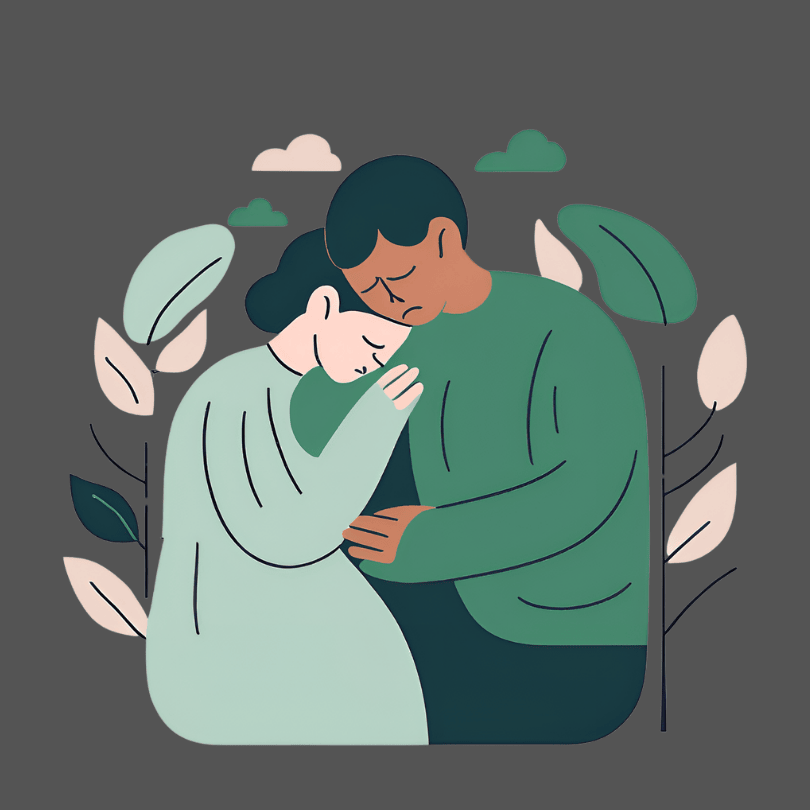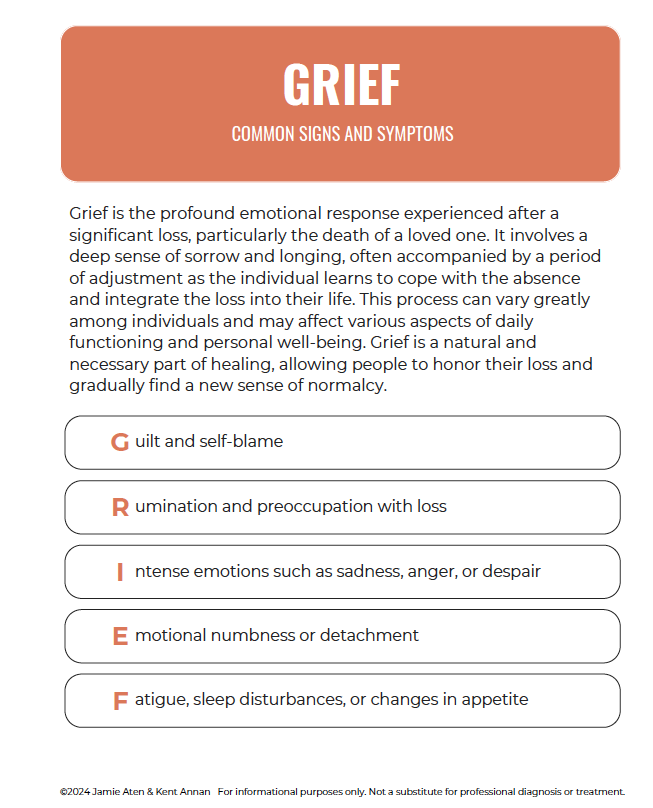
GRIEF: AN OVERVIEW OF ITS SYMPTOMS AND FACT SHEET
Grief is a profound and multifaceted emotional response to loss, whether it be the death of a loved one, the end of a significant relationship, or another major life change. It is a deeply personal experience, often involving a range of intense emotions and physical reactions. Grief doesn’t follow a set timeline, and each person’s journey through it is unique.
Below, we explore some of the common symptoms associated with grief, shedding light on the complexities of this difficult process.
Guilt and Self Blame
One of the most challenging aspects of grief is the emergence of feelings of guilt and self-blame. These emotions often arise as individuals replay past events in their minds, questioning whether they could have done something differently to prevent the loss or alleviate the suffering of a loved one. Thoughts like, “If only I had been there sooner,” or “I should have done more,” can become pervasive, adding to the emotional burden of grief. While these feelings are common, it’s important to recognize that they often stem from an irrational need to find control in an uncontrollable situation.¨
Rumination and Preoccupation
Grief can also lead to rumination—an ongoing cycle of repetitive thoughts—and preoccupation with the loss. This mental fixation can make it difficult for individuals to focus on anything else. They may replay memories, dwell on the circumstances of the loss, or constantly think about what has been taken from them. While reflecting on a loss is a natural part of grieving, excessive rumination can prevent a person from moving forward and may contribute to prolonged or complicated grief.
Intense Emotions: Sadness, Anger, and Despair
Grief often brings a flood of intense emotions that can feel overwhelming. Sadness is one of the most recognized emotions in grief, but it is often accompanied by others such as anger and despair. Anger may arise from a sense of injustice or frustration at the loss, while despair can settle in as the reality of the situation becomes clear. These emotions can be unpredictable, coming in waves, and sometimes catching individuals off guard. It is important to understand that feeling a range of emotions during grief is normal and part of the healing process.
Emotional Numbness and Detachment
On the opposite end of the emotional spectrum, some individuals experience emotional numbness or detachment during grief. Rather than feeling overwhelmed by emotions, they may feel disconnected from them altogether. This numbness can serve as a coping mechanism, a way for the mind to protect itself from the full weight of the loss. However, emotional detachment can also leave individuals feeling isolated, as they may struggle to connect with others or even process their own grief.
Fatigue, Sleep Disturbances, and Changes in Appetite
Grief doesn’t just affect the mind and emotions; it also takes a toll on the body. Many people experience significant fatigue, finding themselves drained of energy as they cope with their loss. Sleep disturbances are also common—some may suffer from insomnia, unable to quiet their minds enough to rest, while others may sleep excessively, seeking escape in slumber. Additionally, grief can lead to changes in appetite, with some individuals losing their desire to eat and others turning to food for comfort. These physical symptoms are a reminder that grief is an all-encompassing experience, affecting both body and mind.
Seeking Help: When Grief Becomes Overwhelming
Understanding these symptoms can help individuals recognize that what they are experiencing is a normal, albeit painful, part of the grieving process. It’s essential to allow oneself the time and space to grieve, seek support from others, and consider professional help if needed. While grief may never fully disappear, with time, the intensity of these symptoms can lessen, allowing individuals to find a new sense of normalcy and peace in their lives.
Last but not least, although grief may be a long and difficult road, we can find strength in prayer, hope in God’s love, and healing through His comfort. God’s Word reminds us that death is not the end, and that one day, in God’s presence, “He will wipe every tear from their eyes” (Revelation 21:4). Through God’s grace, we can navigate grief with the assurance that He is walking alongside us, weeping with us, and providing peace and hope even in our darkest moments.
Check out the Spiritual First Aid Fact Sheet below regarding grief for quick reference.

Enjoyed our blogpost? Subscribe to our newsletter for more resources on mental health and integrating the Gospel message in your healing journey.
If you found our resources useful, please consider donating to Oak Health Foundation, which is a 501(3)c nonprofit dedicated to providing resources regarding holistic mental healthcare and subsidized treatment for those in need.




